Review for Solaris (Tarkovsky)
Introduction
The Soviet 2001! The Cold War brinkmanship between the two superpowers also resulted in a great deal of competitiveness. The most obvious example of this was the Space Race, as both the USSR and the USA competed in challenging the final frontier, to put a man in space, to land a man on the moon, to build a space station, all the way up to the late eighties, when the Soviets built their own shuttle, Buran. In aviation, the British built Concorde, while the Soviets had the Tupolev 144, or Konkordski. The height of the competition in sport wound up with successive Olympic Games in Moscow and Los Angeles, two of the most boycotted Olympics in history. It seems the brinksmanship went as far as culture as well. In 1968, Stanley Kubrick’s sci-fi epic 2001: A Space Odyssey changed the face of cinema, re-wrote the rules. Whatever the West could do, the Soviet bloc could do too, and so in 1972, Andrei Tarkovsky’s Solaris was released based on the Stanislaw Lem novel.
As a child of the Cold War, the East Vs. West brinkmanship fascinated me, and having seen 2001, finding it cold, and sterile, I made a point of watching Solaris on a late night TV showing, close to 25 years ago now. It’s been so long that I barely remember it. All I do recall are a bright orange ocean, and a woman drinking liquid nitrogen, and that I enjoyed Solaris more than I did 2001. Memory does indeed play tricks. It wasn’t liquid nitrogen, it was liquid oxygen, and you only see the aftermath. Hopefully my memory of my opinion of the film isn’t as equally flawed.
The Solaris Space Station is a research mission in orbit around a strange oceanic world. But the exploration of the surface of that world resulted in scientists going missing, and a pilot whose verbal testimony doesn’t match any material evidence. So it is that psychologist Kris Kelvin is sent to the station to investigate what’s happening. He finds a skeleton crew who are certainly in need of psychological evaluation and treatment, haunted as they are by the presence of ‘visitors’. Then Kris Kelvin receives a visitor of his own, his dead wife, Hari.
Picture
Solaris gets a 2.35:1 anamorphic PAL transfer on this DVD, and the film gets a fair treatment on the lesser format. It’s mostly clear and sharp throughout, but the sheer length of the film on a dual layer disc means that compression signs around fine detail do become evident when scaled up to an HD panel, most apparent early on with foliage in the middle to far distance in some scenes. The print also shows some signs of age, although it is mostly clean and stable throughout. But colours do feel faded at times, and there is telltale staining on a few frames. Otherwise the image is pretty decent and watchable. Of course the real attraction is the Blu-ray release of the film, which comes out on the same day as this DVD.
Sound
It’s just the original Russian mono track here, but presented as a PCM 2.0 audio track, at a 1.5Mb per second bitrate, giving the audio the space it requires to breathe, and making that classical score as clear as possible. The dialogue too is clear, and the optional English subtitles are accurately timed and free of typos. Solaris appears to be one of those films which are filmed as silent, and then looped in post-production. Certainly lip sync is a rare occurrence in this film.
Extras
There are no extras on the DVD, although the PR does list a 40 page booklet. The 2-disc Blu-ray release however will have a documentary, featurette and interview.
Conclusion
It appears that my memory did indeed fail me, and last night watching Solaris, I found it to be just as hard a slog to get through as I do 2001: A Space Odyssey, although for completely opposite reasons. I find 2001 to be cold, clinical, focused on the mechanical, exploring the sci-fi to the detriment of human character and emotion. Of course that’s the whole point of 2001. Solaris on the other hand focuses wholly on human character, emotion and interaction to the detriment of the science fiction, pushing it all to the background to the degree that what ought to be the heart of the story, Solaris and its mysterious ocean is practically an afterthought. There are aspects of the sci-fi plotline in Solaris that actually happen off-screen, are merely mentioned after the fact as exposition, and are very easy to miss out on. It can have the effect of rendering the film incoherent, if you’re not glued to the screen during its runtime.
That runtime too is excessive. There’s not a lot of story here, but with the addition of a lengthy and repetitive preamble, and a somewhat bizarre Japanese road-trip, it all gets stretched past the 2-and half hour mark, and there just isn’t enough narrative here to sustain. It’s also a film that is constrained by its budget. Solaris is a fantastic, psychedelic creation, but it’s used for insert shots only. There’s very little sense of integration between the special effects work and the sets, and given the dialogue heavy nature of the piece, once the action shifts to the Solaris station it quickly begins to feel like a theatrical production, not cinema at all.
It also feels a little uncertain of tone. The start of the film is taken up with a lengthy briefing, an explanation of what is happening on the Solaris station, what is suspected to be responsible, and what possible response there should be, although the film remains obtuse about its characters, what role they are playing, letting the audience pick things up as the film unfolds. That certainly introduces a fair degree of confusion about the Kris Kelvin character, who is unlike any psychologist that you’d expect. Certainly the way he treats the pilot Burton tends to indicate a poor bedside manner indeed for a medical professional. It also raises a few questions about the film’s chronology. The questions about the Solaris station seem to require an urgent response, yet it also appears that several years, if not decades have passed between Burton making his report, and then coming to see Kelvin.
Yet when we get to Solaris, all questions about the mystery on the station, the nature of the Solaris ocean, the sci-fi concept behind the film is marginalised in favour of looking at the Solaris residents, and their ‘visitors’. Given that, we don’t get to see much of the visitors that attend the two scientists, Snaut and Sartorius, and instead we dwell on Kelvin and his dead wife Hari. Solaris is a talky, introspective piece which may be interesting in terms of character, intriguing on an intellectual level, but it fails to look beyond its enclosed character drama to inspire as science fiction should. Its story may as well be a supernatural ghost story for the most part, and it’s only with its final few frames that it delivers the twist that sets it firmly in the science fiction stall. But 2 hours and 40 minutes is a long time to wait for a film to justify itself.
The DVD of Solaris is good enough if you’re yet to upgrade, but naturally all eyes will be on the Blu-ray. Unfortunately I didn’t find Solaris to be the sci-fi classic I remembered it to be, or indeed wanted it to be.
































































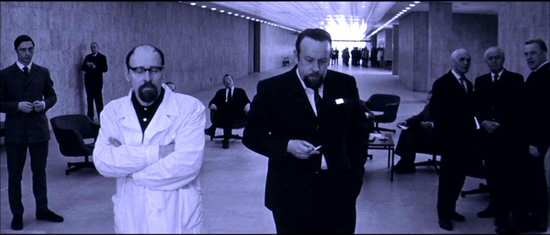


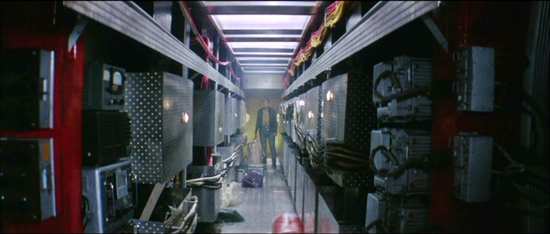

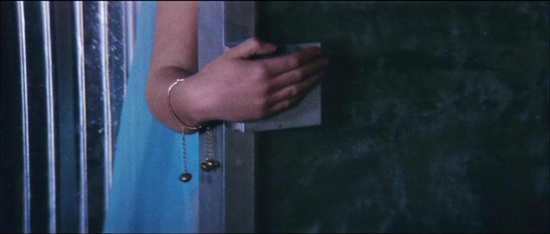
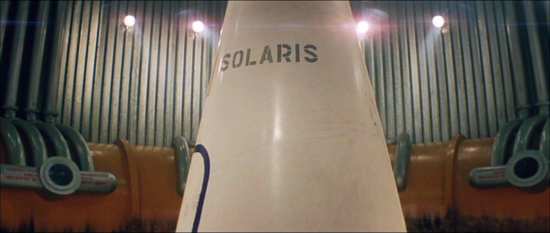
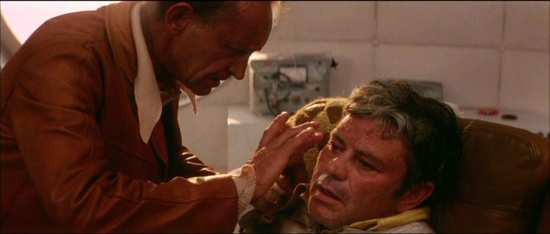
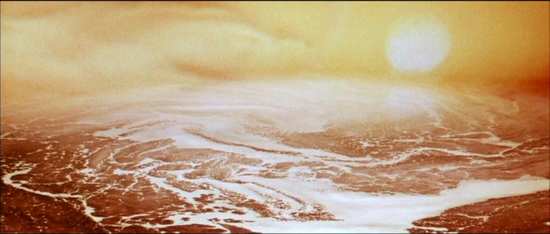
Your Opinions and Comments
Be the first to post a comment!